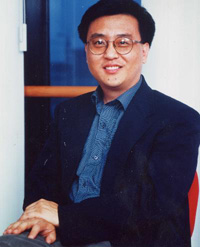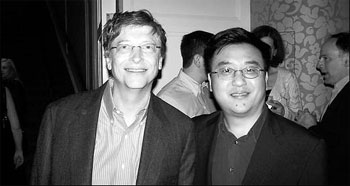Profiles
Becoming Bill Gates' right-hand man
(China Daily)
Updated: 2007-07-05 10:16
 |
Large Medium Small |
At the tender age of 7, Zhang left his home in Taiyuan, North China's Shanxi Province, to attend school. In 1978, aged 12, he entered the University of Science and Technology of China, in East China's Anhui Province.
 |
With a master's degree in electrical engineering under his belt by the age of 18, Zhang left for the United States.
The ensuing years saw him bestowed with a slew of other academic honors, and in 1999, he joined Microsoft, bringing with him a wealth of technical knowledge.
In 2004, Bill Gates announced the appointment of Zhang, then aged 38, as Microsoft's global vice-president.
Now leading the company's research and development group in China, Zhang and his team are driving Microsoft's bold new vision for the vast Asian market.
On April 21, Gates revealed his ambitious plans for China, with research and development parks to be built in its two biggest cities.
"We are initiating a great campus in Beijing and Shanghai that will more than double the capacity to bring great R&D people to those locations," Gates said at the Bo'ao Asia Forum, in South China's Hainan Province.
Last year, Zhang returned to China, integrating Microsoft's various research institutes here into a Beijing-based powerhouse with an annual budget of more than $100 million. The group comprised Microsoft Research Asia, Microsoft Advanced Technology Center, Microsoft China Technology Center and other research institutes in Beijing, Shanghai and Shenzhen.
China R&D Group has become Microsoft's biggest overseas research base. More than 100 innovations from teams here count among Microsoft's critical products, such as the next generation of the Microsoft Windows desktop operating system and the outlook mobile service for Office 2007.
"We had nearly 700 full-time employees last year, and the number has doubled. We have world-class scientists and talented graduates from top universities," Zhang said.
He joined the company as associate dean of Microsoft Research China, with four members. Now, with 1,400 full-time employees under him, Zhang is ready to act on his personal motto: "Chinese wisdom benefits the globe".
Like Gates, Zhang had been labeled a genius long before joining Microsoft.
He learned the value of independence and striving to be stronger than other children. Then, when he was 5 years old, his father died.
His mother, who raised him alone, encouraged him to turn his mind towards his future career. Even now, Zhang often asks himself what it is that distinguishes him from others.
Zhang owes much of his success to a deep-seated thirst for knowledge. As an eager freshman, he once squeezed his way to the front row of Stephen Hawking's 1985 lecture on black holes.
On another occasion, he sat through hours of a Japanese speech, hoping - albeit in vain - to glean at least something from the talk.
On choosing his major, Zhang was again inspired by a speech and moved into the fields of wireless, mobile communications, networking, digital videos and multimedia technology instead of mathematics.
 Dr Zhang Yaqin has risen to become a right-hand man of Bill Gates (pictured below). File Photos |
After he got his master's degree in electrical engineering at the age of 18, a deeper desire for the unknown took him to the United States. He enrolled in George Washington University as an electrical engineering major in 1985.
However, when Zhang arrived in September, he was totally at a loss. Nobody picked him up from the airport and his pre-enrollment record didn't seem to exist.
Zhang had to spend his first weekend in this new world with a kind-hearted overseas Chinese family. He later learned that the university had planned him to enroll in the next semester. But the letter didn't arrive in time.
However, the 19-year-old Zhang took his fate into his own hands. Early in the morning on the third day of his arrival, he found his way to the International Services office of the university, which was several blocks away form the main campus. He convinced the staff that he already had the language skills necessary for his PhD courses. He was enrolled immediately, circumventing the language-course requirements.
Raymond Pickholtz, Zhang's teacher and professor emeritus of engineering, had taught electrical engineering and computer science at George Washington University for more than 30 years before his retirement in 2004.